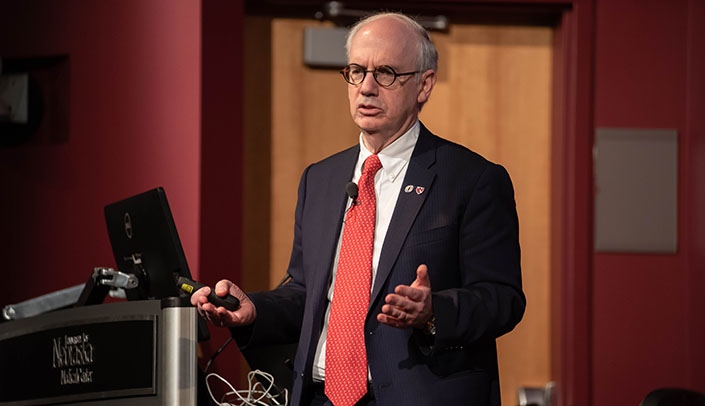UNMC Chancellor Jeffrey P. Gold, M.D., introduced a new word into the campus vernacular during his “Health Care 2050” state-of-the-campus address at the annual Faculty Senate awards ceremony Tuesday.
Disintermediation.
And reintermediation. OK, two words.
Disintermediation removes elements from the supply chain and reintermediation is the reintroduction of an intermediary, usually technology, between a goods producer and consumer. Examples of companies that have taken out employees and inserted technology into the supply chain include Uber, the world’s largest taxi company that owns no vehicles, and Airbnb, which provides access to more than six million unique places to stay in more than 81,000 cities and 191 countries, yet owns no real estate.
See a photo album from the ceremony.
Dr. Gold explained that according to the McKinsey Global Institute, 800 million jobs will be lost to artificial, or augmented, intelligence and automation. Among those jobs, 36% of the health care and social assistance jobs will be transitioned by 2030.
“To survive in this new world, UNMC will need to disintermediate — take pieces out — the health care supply chain between each mission and end goal,” he said. “Then use technology to shorten the distance between patient care and delivery.”
To illustrate this concept, Dr. Gold used diabetes, an illness that affects 425 million people worldwide, according to the International Diabetes Federation.
“There is an entire economy based around health care delivery, much of it in the hands of third party, for-profit companies. If someone with diabetes feels ill, there is a chain of events that occurs, from checking glucose at home to going to the clinic and having tests, to getting a new prescription filled. Each step involves driving, parking, waiting, evaluating, testing and buying.”
What if, he said, most of that chain is eliminated by sending glucose test results directly to the physician through a cell phone? “It’s been proven that diabetes control is tighter when using this type of technology, which means the patient feels better sooner.
“How about other conditions — chronic obstructive pulmonary disease, cancers, addictions, asthma or autism? We could take any condition for which we have a biomarker and an effective therapy and disintermediate the chain,” he said.
But, for some biomarkers, there are inadequate therapies. That’s where research comes to the rescue.
“We could reintermediate health care by using augmented intelligence and biomarkered technology,” Dr. Gold said with a final challenge to faculty to consider new paradigms.
